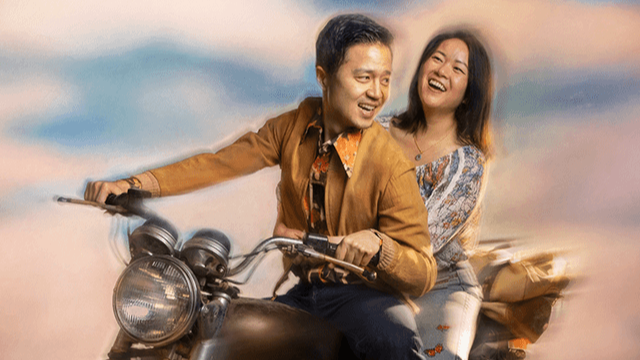An American Love Story

Qui Nguyen’s autobiographical dramatic comedy Vietgone is an engaging, insightful and irreverent portal to the past centered on the sheer resilience of starting over. Nguyen structures the play around the true story of how his parents, Quang and Tong, met in a refugee relocation camp in 1975 Arkansas during the Vietnam War. As they seek to grow accustomed to their new lives in a new country while poignantly reflecting on those they left behind in Saigon, Vietgone blossoms into a charming love story that is deeply relevant and undeniably universal.
In The New York Times review of Vietgone’s 2016 off-Broadway premiere, critic Charles Isherwood wrote, “Mr. Nguyen nails, rather smartly, the dissonance of immigration, which runs both ways — the Americans and the Vietnamese in the play are almost always misunderstanding one another.”
Assimilation is a recurring driving force in the play, but Nguyen says the desire for connection is equally critical to understanding the play’s essential foundation.
“No matter what we look like, no matter how different our customs or histories may be, down deep we are all very much the same than we are different,” Nguyen says. “This is a theme I’m always pursuing in my plays. The exterior circumstances in Vietgone feel very unique — a Vietnamese couple escape Vietnam and reestablish a new life in America but they don’t speak English — but the core value is the same. We all long to be connected.”
The Playhouse’s production is staged by Joanie Schultz, who serves as the Playhouse’s Associate Artistic Director. She views acceptance as a particularly palpable theme fueling the play’s relatable potency. “The story of Vietgone is the most human of stories in that the characters are fighting their situation and rebelling against it. Once they accept what’s happening and where they are and what their life is, they are able to start finding happiness,” Schultz says. “I relate deeply to that. While I haven’t ever lived in a country that is torn apart by war and been thrust into a new country, I have had times in my life that I’ve been in a situation that I wish I wasn’t and fought it to my own detriment. Like many rom-coms, when they stop fighting it, our heroes are able to see the opportunity that they could lose if they keep pushing back.”
As Schultz evaluates the artistic possibilities within the script, she anticipates finding ways to clearly communicate Nguyen’s cinematic-inspired landscape full of heightened storytelling devices. “Qui writes his plays in a fast-paced way, and using the language of film he says ‘cut to’ a lot in the script, signifying that we make a fast transition and are somewhere else suddenly,” she says. “This is a thrilling challenge as a director, especially in the Rosenthal Shelterhouse Theatre, to make fulfilling, clear and fast jumps from one place and time to another.”
.jpg?sfvrsn=7695e80_1)
Joanie Schultz and Qui Nguyen
One of the most entertaining aspects of Vietgone is its clever use of hip-hop. Choosing to elevate Quang and Tong’s inner thoughts with terrifically introspective rhymes was a natural fit for Nguyen, who grew up a huge fan of such hip-hop icons as LL Cool J, Run-D.M.C., The Fat Boys and Kool Moe Dee.
“The music I listened to the most was hip-hop,” he says. “I love rap, but I don’t have the tongue dexterity to spit rhymes really fast. When I sat down to write Vietgone, because it is a story about my family screened through a youthful version of myself, I wanted to make sure the things I loved are there such as random martial art fights and hip-hop as a means of telling interior monologues.”
Schultz echoes this idea. “The fact that our two lead characters express their most emotional moments in rap music is wonderful — it’s not a musical, but music is important to the piece,” she says. “I feel like the songs work more like arias in an opera, they give the characters an opportunity to explore an emotional state but using contemporary pop music styles they are even more relatable to us as a modern audience.”
Above all, Schultz hopes audiences find the experience of seeing Vietgone personable and inspiring. “I hope they have a great time and fall as in love with these characters, rooting for them, like I do, and I hope they feel the same uplift I do about the human experience and our ability to persevere in the most unlikely of circumstances,” she says. “As Rhianna sang, ‘we found love in a hopeless place.’”